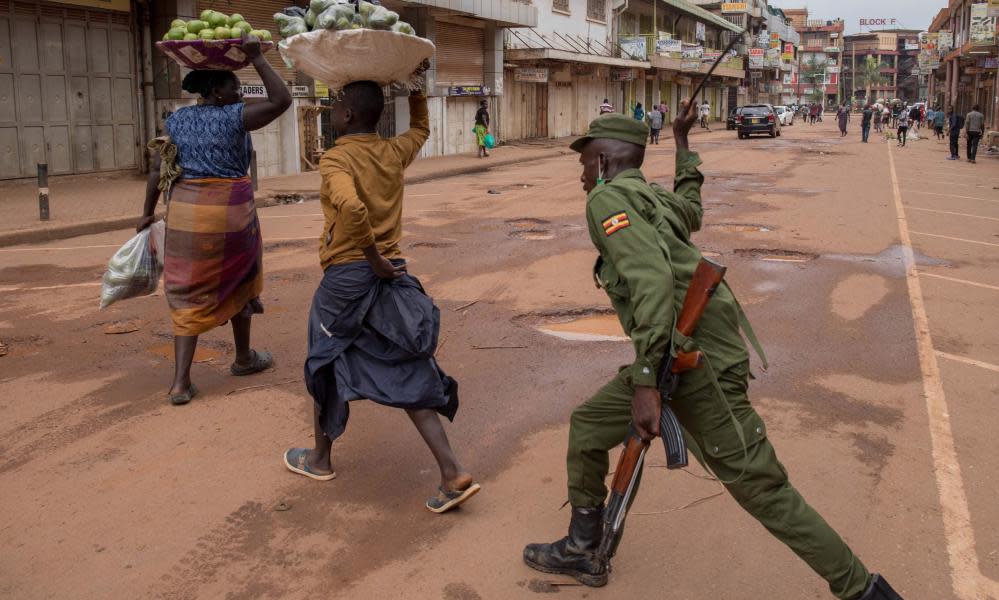We Ugandans are used to lockdowns and poor healthcare. But we’re terrified

In Uganda, for the first time since 2013, more than three people can legally meet without needing to inform the police. Last week, parts of the Public Order Management Act, a law used to gag political opponents, was declared unconstitutional. But most Ugandans are staying away from crowds and keeping at home to control the spread of coronavirus.
The government moved quickly to close schools and universities. Measures became more and more stringent – closing borders, compulsory quarantine, banning public transport and the sale of non-food items at open markets.
While even the toughest critics of the president, Yoweri Museveni, who has been in power for 34 years, agree that these measures – and even more stringent ones – are necessary, they fear that the government may use coronavirus as an opportunity to clamp down on political freedoms once and for all.
The rest of the world is having a taste of what it feels like to live with human rights limitations. Traditional violators such as Uganda can claim to feel vindicated when they hear that democracies such as the UK have postponed local elections. The world is realising what many African leaders have known all along, they can argue: human rights are overrated and may stand in the way of “efficiency”.
“It is only a coincidence [the] court decision to allow gatherings comes at a time when we cannot exercise freedom of expression,” says Michael Aboneka, a public interest lawyer and governance expert working with Action Aid. “But we cannot ignore the underlying symbolism. Coronavirus presents opportunities for the government to strengthen its grip.”
More than 21% of Ugandans live in poverty. At least 60% of them might become poor in the face of disaster. The UN has already warned of the devastating economic impact of coronavirus on Africa, with £24bn equivalent to Uganda’s GDP last year – already lost to the pandemic.
“Nobody is thinking about what will happen to the woman who can no longer sell her sweets, or go from home to home doing people’s hair. Who is thinking about the HIV positive woman who cannot get her medicine?” says Prima Kwagala, health rights lawyer and founder of Women’s Probono Initiative.
She also asks how 10 people who sleep in one hut will socially distance; how women will cope with abusive men being around all the time; how refugees who live closely together and pastoralists who know no life other than that of moving from place to place with their animals will get by. On the day the government gave the first directive to close schools and implement social distancing, Betty Lukriyana, who lives in a fenced homestead of 34 families in Karamoja, one of the poorest regions in an already poor country, had never heard of coronavirus. She is hardly alone.
Museveni and his family have been criticised for being detached from the reality of ordinary Ugandans, whether they are asking parents who can barely buy food for their children to buy food flasks, grounding public transport and businesses without giving alternatives, or pushing for social distancing without addressing the question of crowded homes in villages and slums.
People had money, ready to run away. Now they are in the same broken hospitals as those they were running from
Anthony Masake
Under Museveni, government officials, including his family, routinely travel for medical treatment abroad, never experiencing the vagaries of an incompetent health system. Uganda spends more than £60m on treatment of government officials abroad and has only 55 intensive care unit beds for its 42 million people.
In Uganda, high maternal mortality, patients sleeping on hospital floors or on beds without mattresses, and a lack of protective gear are not things that happen only in emergencies and pandemics – they are an inherent part of the health system. The World Health Organization has warned African countries to brace themselves for the worst, as coronavirus is likely to stretch already struggling health systems to breaking point.
While African governments, including Uganda’s, insist that experiences with outbreaks such as Ebola and cholera have prepared them to handle Covid-19, cracks are apparent. Politically connected people bribe their way out of quarantine. Emergency lines are not reachable. Children aren isolated without food, water or medicine.
In some cases, phones and laptops have been taken away to silence quarantined critics, including Jimmy Spire Ssentongo, a cartoonist and university lecturer. He spoke up for people facing coronavirus injustice after he shared his quarantine experience on Facebook and criticised government unfairness in charging people in quarantine $100 a day.
In Uganda, the situation of poor people is encompassed in a euphemism, popularised last Christmas when prices rose sharply, as they do every year. “Omwavu wakufa”, the poor person is meant to die. This summary of powerlessness and resignation came up again in the face of Covid-19. Even as the government issues directives for people to stay at home, it has promised no financial bailout or tax relief. People who live from hand to mouth, barely earning enough to feed their families each day, know that hunger may kill them before coronavirus does.
But Anthony Masake, an activist working with Chapter Four, one of the organisations that supported the challenge against the Public Order Management Act, is optimistic that coronavirus might be the lesson African autocrats need.
“People had their money, ready to run away in case of things like war. And now here is a pandemic, and they are stuck in the same broken hospitals as people they were running away from,” he says.
After the crisis, there will have to be candid conversations about the state of healthcare and the country. With this virus, people over 60 are most threatened – and those are the people with power.
• Patience Akumu is a freelance journalist based in Uganda

 Yahoo News
Yahoo News 
